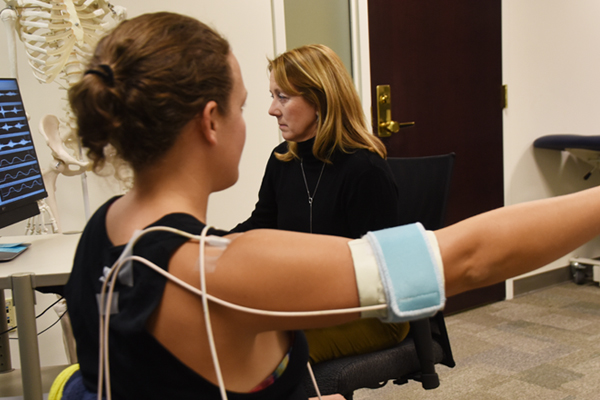Margaret Finley Wins Career Development Award
November 30, 2017
Congratulations are for Margaret Finley, PT, PhD, who is a recipient of Drexel’s 2017-2018 Career Development Award! The award is offered each year through the Drexel University Office of Faculty Affairs and is open to all Drexel University and Drexel University College of Medicine pre-tenure faculty members. With the award comes a $6,000 grant for the faculty member to develop their research line through mentorship outside of Drexel. Finley was one of seven recipients in 2017.
With the award, Finley invited three nationally known scholars to mentor her as she works on her current research project, “Biopsychosocial Approach to Musculoskeletal Pain with Applications to Spinal Cord Injury,” which focuses on building a model of musculoskeletal pain development and progression in people following spinal cord injury.
 Finley’s first mentor to arrive will be Steven George, PT, PhD, professor and director of the Musculoskeletal Research Institute at Duke University. “Dr. George is known for his work in chronic pain, specifically the interaction of psychosocial and genetic factors in people who develop chronic pain,” said Finley. Next, she will work with Richard Shields, PT, PhD, chair of the Department of Physical Therapy and Rehabilitation Science at University of Iowa, who according to Finley is one of the most prolific researchers providing a systems approach to improve health in people with spinal cord injury. Both George and Shields will give lectures when they visit, which will benefit not only people in CNHP but also the community at large, such as people from Magee Rehabilitation Hospital, Temple University, Thomas Jefferson University and the University of Delaware.
Finley’s first mentor to arrive will be Steven George, PT, PhD, professor and director of the Musculoskeletal Research Institute at Duke University. “Dr. George is known for his work in chronic pain, specifically the interaction of psychosocial and genetic factors in people who develop chronic pain,” said Finley. Next, she will work with Richard Shields, PT, PhD, chair of the Department of Physical Therapy and Rehabilitation Science at University of Iowa, who according to Finley is one of the most prolific researchers providing a systems approach to improve health in people with spinal cord injury. Both George and Shields will give lectures when they visit, which will benefit not only people in CNHP but also the community at large, such as people from Magee Rehabilitation Hospital, Temple University, Thomas Jefferson University and the University of Delaware.
The last of her mentors through the Career Development Award will be Laura Frey Law, MPT, MS, PhD, an associate professor in the Department of Physical Therapy and Rehabilitation Science at the University of Iowa who Finley will travel to visit. “Her research investigates factors that contribute to pain variation such as sex, psychological traits, genetics or activity level. She’s someone I’ve known through my biomechanics background and I look forward to learning from her.”
Shortly after finding out about the Career Development Award, Finley was also funded by a Department of Defense grant to the tune of $675,000. “It’s a three-year, multi-site grant. I’m the principal investigator (PI) in collaboration with former colleagues at The University of Maryland Rehabilitation and Orthopedic Institute, in addition our Drexel site will be working with Magee Rehabilitation Hospital. We’re trying to develop a biopsychosocial prospective surveillance model for development of shoulder pain following spinal cord injury. For this grant, we’re assessing people who are in in-patient rehabilitation following a new spinal cord injury. We’re going to follow up with them at six months and a year and see what happens.”
Initial shoulder pain is expected when beginning to use a wheelchair. Finley’s research intends to find out why some people end up with chronic pain and some don’t. A previous study, funded by CNHP, looked at physical factors, but this new study will also add psychosocial variables of fear of movement and pain catastrophizing. The main aim of the grant is to discover where interventions may be needed, whether physical and/or behavioral. Finley hopes to collaborate with a rehab psychologist eventually as well as add saliva and/or blood-based biomarkers to further develop the model.
Patients in wheelchairs have not always been Finley’s focus. Before she began her PhD program, she was practicing clinically as an orthopedic physical therapist in sports, even working with some minor league baseball players. However, when she arrived at the University of Maryland in 1998, her mentor’s research was the biomechanics of wheelchair propulsion. “I thought, ‘how can I use my experience with this?’”
Finley soon learned that many people who use a manual wheelchair have shoulder problems, which became the topic of her dissertation. “My work looked at shoulder impingement, a common orthopedic condition in the healthy population and the population of wheelchair users. I looked at how they propelled the chair as well as how they performed transfers by using three-dimensional motion analysis and electromyography.” 
Her PhD work also led her to become involved in wheelchair sports. “I’m a still a classifier for the National Wheelchair Basketball Association. I was at the Sydney Paralympics, which was a fabulous experience. I have worked with some track and field athletes, more field athletes than on the racing side, wheelchair rugby and wheelchair tennis. I was able to take my sports med background and apply it to this wheelchair-based population, athletes and non-athletes, and look at their shoulders. It is a wonderful population to work with!”
Following her PhD she went on to do a post-doctoral fellowship followed by a Career Development Award with the U.S. Department of Veterans Affairs (VA). “The people I worked with were looking at individuals with stroke. I was involved in robotics intervention development, and looking at the biomechanical changes in people with stroke.” Finley believes it was because of her work with the VA that makes her such a good fit for the Department of Defense grant.
By: Maggie McCrea